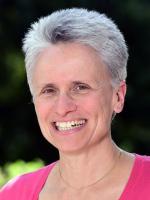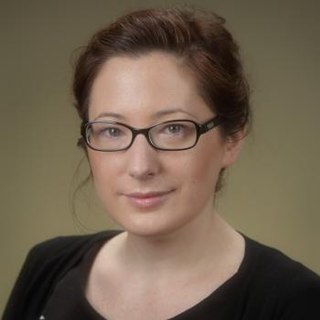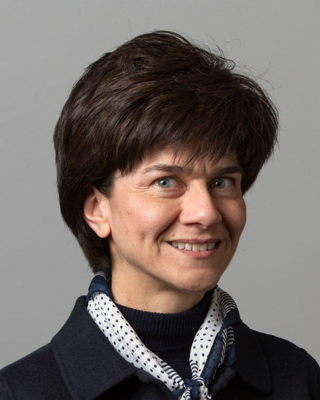Related Research Articles
The Keck School of Medicine of the University of Southern California teaches and trains physicians, biomedical scientists and other healthcare professionals, conducts medical research, and treats patients. Founded in 1885, it is the second oldest medical school in California after the UCSF School of Medicine.

Elizabeth Stern was a Canadian-born American pathologist, especially well known for her insights on the cell's progression from a healthy to a cancerous state. Stern was one of the first scientists specializing in cytopathology, the study of diseased cells.
Race and health refers to how being identified with a specific race influences health. Race is a complex concept that has changed across chronological eras and depends on both self-identification and social recognition. In the study of race and health, scientists organize people in racial categories depending on different factors such as: phenotype, ancestry, social identity, genetic makeup and lived experience. "Race" and ethnicity often remain undifferentiated in health research.
Graham Andrew Colditz MD, DrPH is an Australian chronic disease epidemiologist. He is the inaugural Niess-Gain Professor at Washington University School of Medicine, where he is associate director for Prevention and Control at the Alvin J. Siteman Cancer Center. He directs the Master of Population Health Science at Washington University School of Medicine. During medical training he was excited by the potential for prevention of chronic diseases. With encouragement from mentors he pursued training in the US as it was routine for academics in Australia to obtain overseas training at that time. He is internationally recognized for leadership in cancer prevention, and is often interviewed by media for input on this topic. With members of Cancer Prevention and Control at Siteman, he blogs on issues relating to cancer prevention and screening. According to Google Scholar statistics, Colditz has a h-index of more than 300. Colditz was a member of the Institute of Medicine Committee to Review Adverse Effects of Vaccines but resigned, along with Ruby H. N. Nguyen, before it produced its seminal report.

The USC Norris Comprehensive Cancer Center is a cancer center owned and operated by the University of Southern California (USC) through its Keck School of Medicine. It was one of the first eight comprehensive cancer centers in the United States, which is devoted to patient care, prevention, research, and education.
Cornelia "Neli" Ulrich is executive director of the Comprehensive Cancer Center at Huntsman Cancer Institute (HCI), Jon M. and Karen Huntsman Presidential Professor in Cancer Research, and former Division Chief of Cancer Population Sciences in the Department of Population Health Sciences at the University of Utah. Ulrich oversees HCI's academic consortium of nearly 200 cancer research teams. She leads efforts to advance the impact of HCI's research in laboratory, clinical and population science, with the goal of improving cancer prevention and treatment. Prior to joining HCI, she was the director and department head of preventive oncology at the National Center of Tumor Diseases (NCT) and German Cancer Research Center (DKFZ) in Heidelberg. During this time, she also held a Professorship at the DKFZ and University of Heidelberg. From 1993 until 2009, Ulrich was a Member of the Fred Hutchinson Cancer Research Center and Professor in Epidemiology at the University of Washington in Seattle.

Bhramar Mukherjee is an Indian-American biostatistician, data scientist, professor and researcher. She is currently serving as the inaugural Senior Associate Dean of Public Health Data Science and Data Equity at the Yale School of Public Health from August 1, 2024. She is also appointed as Anna MR Lauder Professor of Biostatistics, Professor of Epidemiology with secondary appointment as Professor of Statistics and Data Science at Yale University.

Chanita Ann Hughes-Halbert is an American psychologist and medical researcher. She is professor of psychiatry and behavioral sciences at the Medical University of South Carolina and the AT&T Distinguished Endowed Chair for Cancer Equity at the Hollings Cancer Center. She is the first woman and first African American from South Carolina elected to the National Academy of Medicine.

Lucile L. Adams-Campbell is the first African-American woman to receive a PhD in epidemiology in the United States. She serves as the Professor of Oncology at Lombardi Comprehensive Cancer Center and associate director for Minority Health at the Georgetown University Medical Center. She is a Fellow of the National Academy of Medicine, and the Washington DC Hall of Fame.

Monica S. Webb Hooper is an American behavioral scientist and clinical psychologist serving as deputy director of the National Institute on Minority Health and Health Disparities. She was a professor at Case Western Reserve University and associate director for cancer disparities research and director of the Office of Cancer Disparities Research in the Case Comprehensive Cancer Center.

Montserrat García-Closas, M.D., M.P.H., Dr.P.H., is a Spanish researcher and academic who is best known for her works on identifying cancer biomarkers and genetic susceptibility to cancer. Dr. García-Closas serves as the deputy director of the Division of Cancer Epidemiology & Genetics (DCEG) of the National Cancer Institute, as well as the Acting Chief of the Integrative Tumor Epidemiology Branch of the DCEG.
Folakemi Titilayo Odedina is a Nigerian-born scientist and professor of pharmacy and medicine at the University of Florida. She is the principal investigator for the Prostate Cancer Transatlantic Consortium (CaPTC), a clinical research group using genomic science and environmental etiology to exploring disproportionate burden of prostate cancer among Black men funded by the NCI. She is a member of American Cancer Society's National Prostate Cancer Disparities Advisory Team.

Xiaohong Rose Yang is an American biomedical scientist researching the genetics of dysplastic nevus syndrome and chordoma, and etiologic heterogeneity of breast cancer. She is a senior investigator at the National Cancer Institute. Yang leads breast cancer studies in mainland China, Hong Kong, and Malaysia.

Stephanie J. London is an American epidemiologist and physician-scientist specializing in environmental health, respiratory diseases, and genetic susceptibility. She is the deputy chief of the epidemiology branch at the National Institute of Environmental Health Sciences.

Bríd M. Ryan is an Irish biomedical scientist and cancer researcher. She was an investigator at the National Cancer Institute from 2013 to 2021.
Caryn E. Lerman is an American psychologist. She is the director of the USC Norris Comprehensive Cancer Center through the Keck School of Medicine.

Maria Teresa Landi is an Italian epidemiologist and oncologist who researches genetic and environmental determinants of lung cancer and melanoma. At the National Cancer Institute, she is a senior investigator in the integrative tumor epidemiology branch and a senior advisor for genomic epidemiology. Landi is an associate professor of epidemiology at the Johns Hopkins Bloomberg School of Public Health.
Kathy J. Helzlsouer is an American oncologist, internist, and cancer epidemiologist who investigates cancer etiology and prevention, women's health, genetic counseling, and translational research. At the National Cancer Institute, she is the associate director of the epidemiology and genomics research program and chief medical officer for the division of cancer control and population sciences.
Melissa Lynn Bondy is an American cancer epidemiologist serving as the chair of the department of epidemiology and population health at Stanford University School of Medicine.

Marcia Roxana Cruz-Correa is a Puerto Rican physician-scientist and gastroenterologist known for her work in gastrointestinal oncology, focusing on the genetics and prevention of gastrointestinal cancers. She is a professor at the University of Puerto Rico School of Medicine and the executive director of the UPR Comprehensive Cancer Center.
References
- 1 2 3 4 Stern, Mariana Carla (1997). Genetic Analysis of Tumor Progression Susceptibility in the Mouse Skin Model (Ph.D. thesis). The University of Texas Graduate School of Biomedical Sciences at Houston. ISBN 978-0-591-42317-4. OCLC 747978516.
- 1 2 3 4 5 6 7 8 9 10 11 12 "Mariana Stern, PhD - USC Norris Comprehensive Cancer Center". uscnorriscancer.usc.edu. 2020-09-04. Retrieved 2024-10-19.
- 1 2 3 4 "Mariana C. Stern, PhD". Keck School of Medicine of USC. Retrieved 2024-10-19.